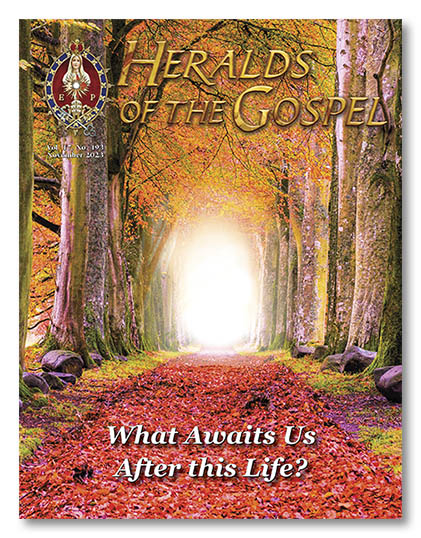As much as one may wish to escape the implacable reality of death, there is a deep certainty within us that we are all going to die. This conviction is so deeply rooted in the core of human nature that it can be compared to the evidence of first principles, or the fact that two and two are four. In many cemeteries, we read the famous exhortation of the deceased to the living: “I was what you are, you will be what I am.”
The contemporary world, however, lives not only as if God does not exist, but also as if the hour of death will never come. In fact, one of the reasons for living as an atheist is precisely the denial of life beyond the grave. If God does not exist, everything is permissible, with no accounts to be paid…
To this end, man tries to subvert the purpose of his existence, so as to live under the mantra of appetites, riches, honours, “doing what he wants to do”… However, life inexorably imposes challenges, difficulties and crosses that invite us to change our conduct and to place our trust in the Lord: “For God alone my soul waits in silence, for my hope is from Him” (Ps 62:5). There is no other peace than that which comes from above, and there is no true hope other than that which leads to eternal beatitude.
And where there is no hope there is literally despair, precisely because when man comprehends his limitedness in the face of the impossible – that is, happiness on this earth – he ends up rebelling against the order of things and against himself. In fact, never in the history of humanity have there been so many mental disorders as there are now…
Paradoxically, the era most marked by the avoidance of death is also the one yielding the highest number of homicides, abortions and suicides. What is more, the last century was the one that claimed the most lives in wars.
If earthly existence no longer has much meaning, what about eternal life?
There are the more stoic positions, such as that which states that life is just a passage and death is a journey of no return. However, such views are clearly incomplete.
As some spiritual authors have commented, a virtuous life on this earth is already the beginning of Heaven. In other words, it is separated from beatitude by only an interstice, death.
After that, a new journey begins, but not before passing a “customs” called particular judgement. The passport of the earthly journey is checked to see if the traveller is fit to undertake the most extraordinary of all journeys: the route that leads to the pulchritude of God himself. However, if the visa is denied, all that remains is for the traveller to explore the slums of the eternal abyss…
Everything would seem to be over. However, even in glory, the soul remains in a state of violence, longing to return to the body of which it is the form. And this will indeed happen at the final resurrection and the Universal Judgement, when Our Lord will return to judge the living and the dead. The good will then be taken up to a place “above all the heavens” (Eph 4:10), the Empyrean Heaven, where they will live forever with Christ in His glory. ◊



